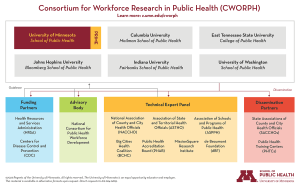
Minneapolis/St.Paul | October 25, 2022 — The COVID-19 pandemic overwhelmed a public health infrastructure already underfunded and understaffed — it has lost up to 20% of its practitioners since 2008. Workers were stretched thin, burned out, and anxious. They still are, and the situation presents a serious need to increase workforce capacity for current and future emergencies.
Supported with a first-of-its-kind joint $4.7 million cooperative agreement from the Health Resources & Services Administration (HRSA) and the Centers for Disease Control and Prevention (CDC), six U.S. universities have now come together to conduct robust workforce research, evaluation, and analysis to help remedy the situation:
- University of Minnesota School of Public Health
- Johns Hopkins University’s Bloomberg School of Public Health
- Columbia University Mailman School of Public Health
- Indiana University Fairbanks School of Public Health
- University of Washington School of Public Health
- East Tennessee State University College of Public Health

The unique collaboration is called the Consortium for Workforce Research in Public Health (CWORPH). Led by the Center for Public Health Systems at the University of Minnesota School of Public Health (SPH), CWORPH’s research will look at what drives turnover, ways to recruit and retain staff, and how to fill workforce gaps. The consortium also includes several national practice-oriented partners, such as the National Association of County and City Health Officials, Public Health Training Centers, and the de Beaumont Foundation, that will help identify chronic and acute public health needs so CWORPH can investigate them and deliver answers back to the community.
“Our country badly needs a bigger and stronger public health workforce equipped with the requisite tools to address contemporary challenges and threats,” says SPH Interim Dean Timothy Beebe. “We are excited about CWORPH and honored to leverage the expertise of this school with that of our university partners to advance public health capacity.”
Each of the six consortium members has a deep and longstanding commitment to the mission of public health and the sustainable development of its workforce including increasing diverse public health staff that represents the communities they serve; public health staff retention; efficient public health workforce systems and processes; and capabilities to implement public health advances.
On the ground with its practice-oriented partners, the consortium’s work will include quantitative and qualitative research to better understand public health workforce needs; large-scale survey data collection and analysis; economic analysis to understand options for resource allocation; and health equity research with a focus on the needs of racial, ethnic minority, and rural communities.
“This consortium exists because the public health community has come together to build the research base around the public health workforce — the need is broad, and it is deep,” said the project’s lead, JP Leider from the U of M School of Public Health. “With funding from HRSA and CDC, and the support of our partners, this feels like the first time in a while where we have been able to say that all parts of the public health workforce matter — rigorous, practice-oriented research included.”
CWORPH members and faculty leads are:
University of Minnesota School of Public Health, JP Leider and Janette Dill; Johns Hopkins Bloomberg School of Public Health, Beth Resnick; Columbia University Mailman School of Public Health, Heather Krasna; Indiana University Fairbanks School of Public Health, Valerie Yeager; University of Washington School of Nursing, Betty Bekemeier; and East Tennessee State University College of Public Health, Michael Meit.
CWORPH partners are:
CWORPH is advised by the National Consortium for Public Health Workforce Development. Technical partners include: National Association of County and City Health Officials, Big Cities Health Coalition, Association of State and Territorial Health Officials, Association of Schools and Programs of Public Health, Public Health Accreditation Board, MissionSquare Research Institute, and de Beaumont Foundation. Dissemination partners include: State Associations of County and City Health Officials and Public Health Training Centers. It is funded by the Health Resources and Services Administration (HRSA) and the Centers for Disease Control and Prevention (CDC).
Learn more about the Consortium for Workforce Research in Public Health (CWORPH), including how to stay connected to CWORPH and partner around its work on public health workforce research and evaluation.

